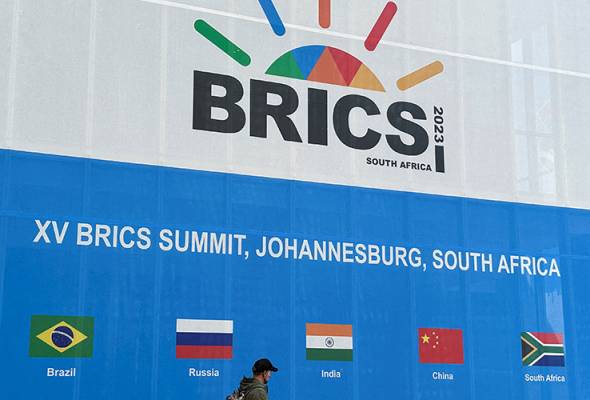
Published in AstroAwani, BusinessToday, TheStar, MYsinchew & News Hub Asia, image by AstroAwani.
Though, the 2023 six State Elections (PRN-2023) have passed, some politicians across all aisle, are still using the results to push their own parochial and divisive narratives that will harm the nation more. However, responsible leaders can and must learn from the outcome and take necessary corrective actions towards rebuilding the nation for the many . Here EMIR Research elaborates on it as a part of its public audit exercise.
EMIR Research used historical state elections trend analysis, General Election (GE) 15 voting patterns, more recent poll aggregation and its own ground survey data as inputs for its statistical models to generate its PRN-2023 projections. The analysis assumed that voting patterns could not have shifted significantly in such a short time.
As a result of analysis, out of 245 contested seats, 45 emerged as too close to call (winning majority within plus/minus 1,500 votes) – most of these indeed turned out to be marginal wins eventually. Out of the remaining 200 seats, only 10 have turned out to be blind spots, while the rest were accurately projected (Figure 1).
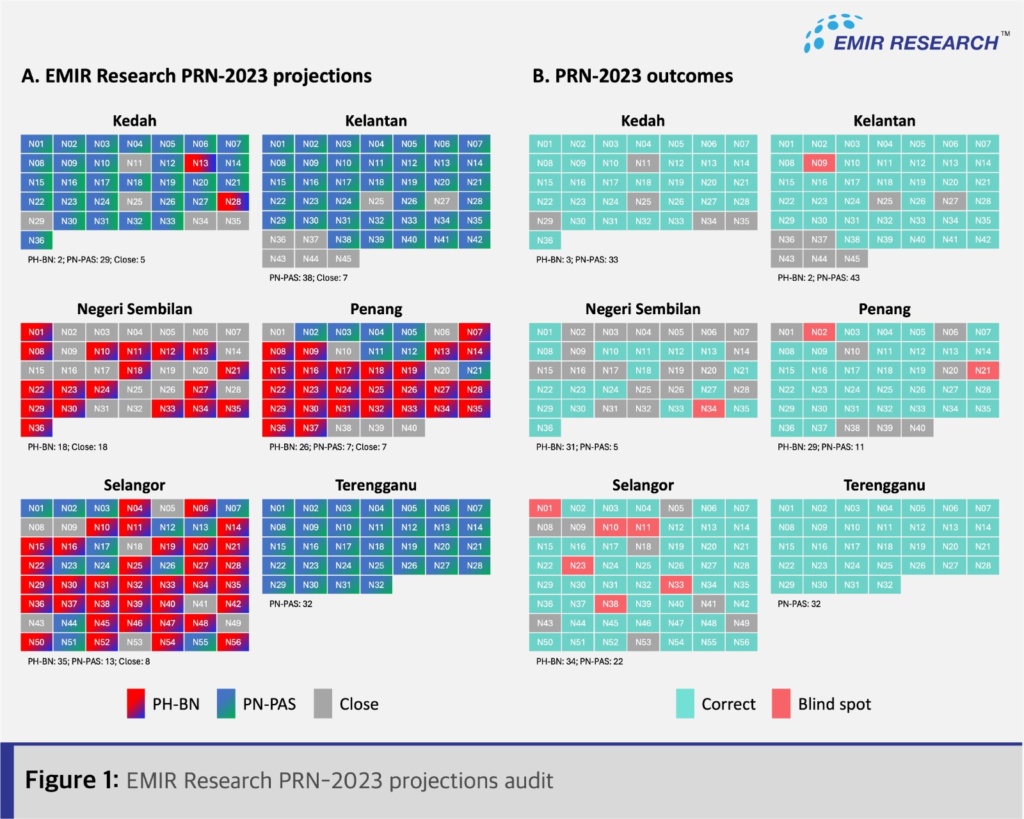
However, the fact that most win projections could have been modelled so well, especially along the ethnic differences, should be concerning. This means Malaysia remains as divided as ever (if not more), sorrowfully, when it needs unity the most due to the seriousness of the challenges it faces given geo-politics and geo-economics.
This suggests that Malaysia’s political scene, including its leaders and voters, is not yet fully developed. Some leaders rely on identity politics of race and religion instead of creating effective policies, while voters don’t always consider the character and integrity of potential leaders or the complex issues facing the country. Too often, harmful and divisive rhetoric is accepted without thought, like a child eagerly accepting a can of candies.
Figure 2 illustrates the expected polarization of Malaysian voters in PRN-2023, with a clear divide based on ethnicity and urban-rural demographics. The PH party was dominant in areas with less than 60% Malay population, particularly in highly urbanized regions. On the other hand, the PAS led PN coalition retained its power in regions with a higher percentage of Malays, especially those with 80% and above, but with a less dense population (refer to Figure 2A for more details).
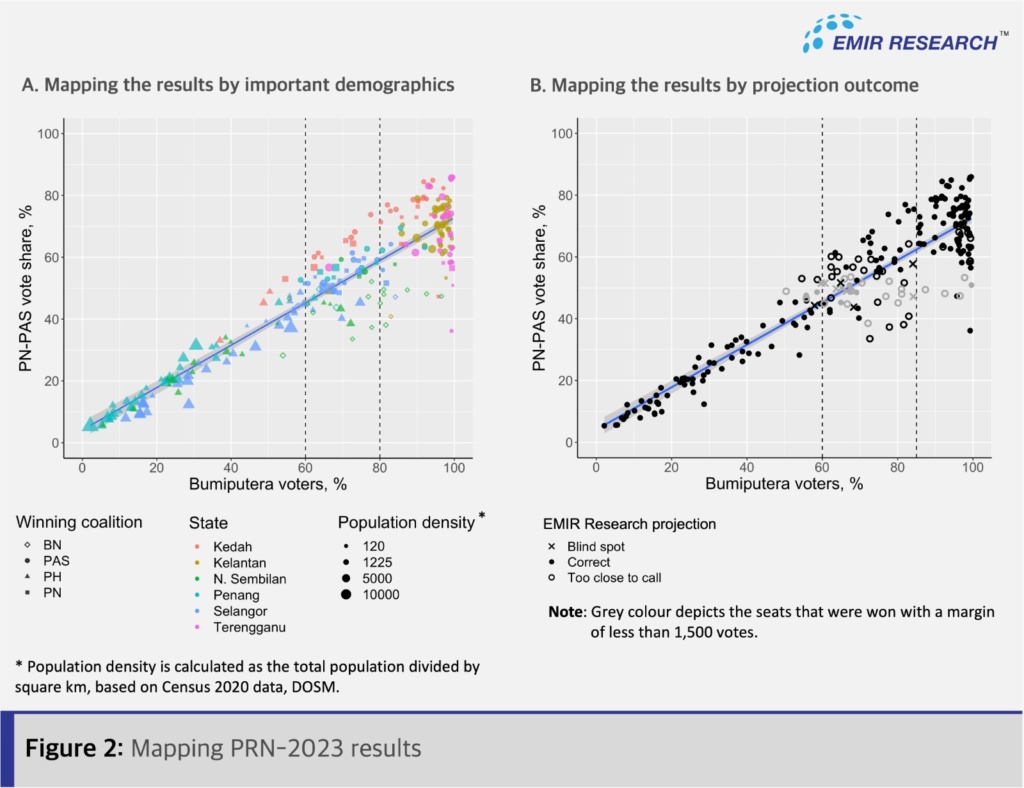
It is those seats with the Malay voters proportion between 60% and 80% that were difficult to see and eventually resulted in a lot of very narrow wins and most blind spots for EMIR Research (Figure 2B). BN also performed better in these seats, although mostly with a narrow margin.
Furthermore, the pattern of how the data points are spread around the trendline in Figure 2A also indicates, among other things, that the Malay ethnic group living in areas with lower population density is still the most divided in terms of their party/coalition of choice, particularly with the Malay voters proportion between 60% and 80%.
The ethnic demographic-based support for the PAS-PN coalition followed a similar trend to that of GE-15 (as shown in Figure 3A). However, there was a noticeable increase of PAS-PN vote share of about 10% across the board consistently – the parallel trendline shift in Figure 3A.
Apparent is the reversal of the established trend for BN of electoral decline since GE-12 (Figure 3B). Additionally, based on the distribution patterns in Figure 3, it appears that the transfer of votes from BN to PAS-PN is almost complete, especially within communities where Malays make up the majority. This raises concerns about the current administration’s ability to withstand the next GE.
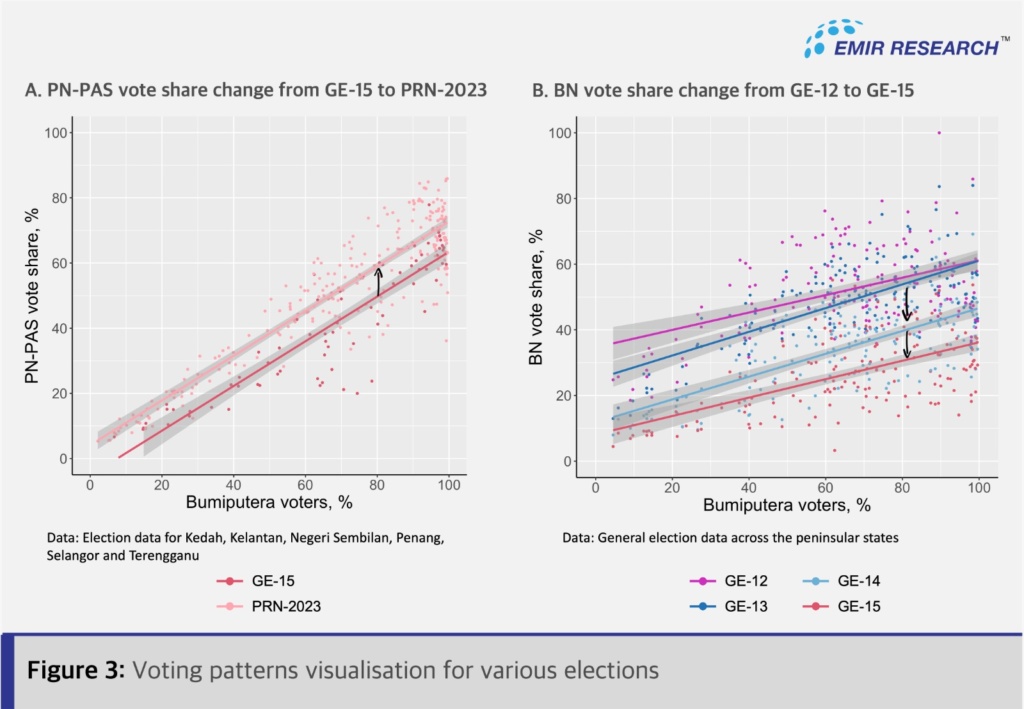
Figure 4 visualises changes in the composition of seats after PRN 2023.
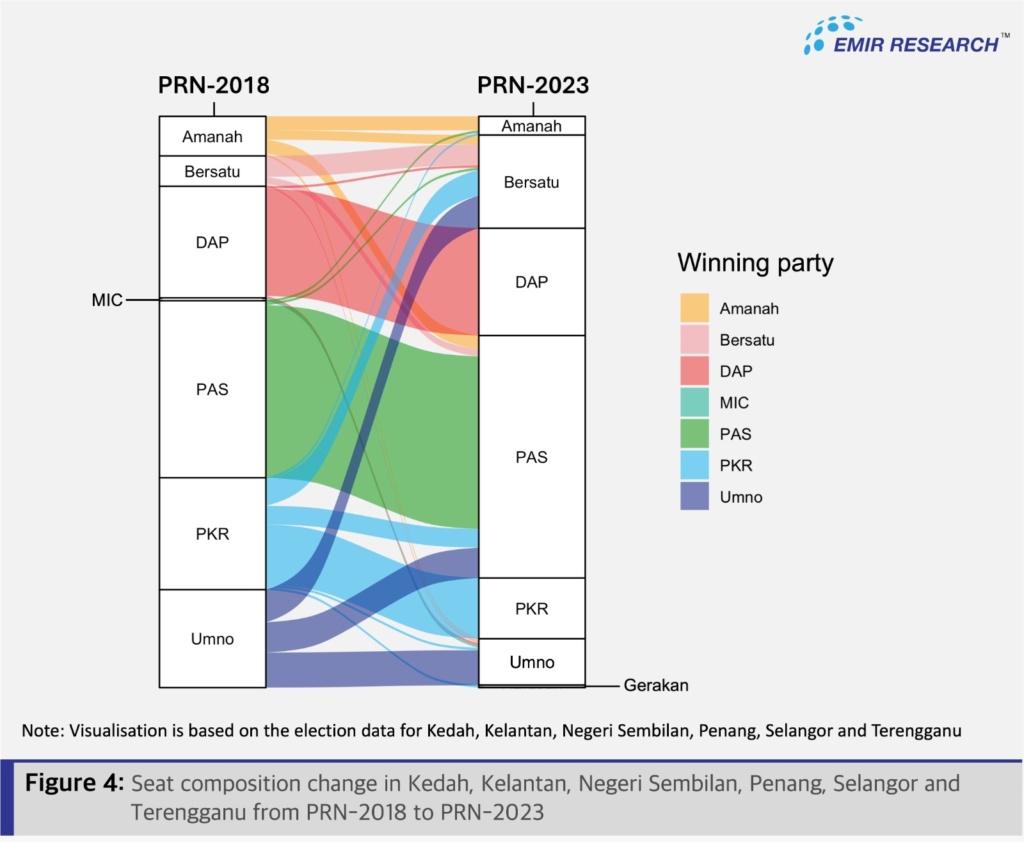
Once again, Figure 4 highlights the existential crisis faced by UMNO. It is evident that UMNO has lost approximately two-thirds of its seats in six contested states compared to the previous state election – these seats are now almost equally shared between PAS and Bersatu.
A nearly identical dynamic is observed for Amanah – two-thirds of its seats are now shared by PAS and Bersatu.
PKR also lost slightly over one-third of its seats that, again, more or less equally were shared between PAS and Bersatu.
DAP is the only party within the Unity Government that maintained its base well.
Meanwhile, PAS and Bersatu (especially Bersatu) saw the most significant increase in their number of seats in PRN-2023 compared to the previous state election.
However, is this really evidence of the so-called “green” or “blue” or “green-blue wave”? By no means should we over-interpret the patterns we observe in Figure 4, especially in the context of the whole of Malaysia. For this same reason, the state election cannot be viewed as a “referendum” on the current administration, even though certain quarters would like us to believe otherwise, just as they want now to convince everyone that the association with PH is damaging for BN.
However, contrary to this narrative, the election data indicates that, surprisingly, BN did not perform as poorly in PRN-2023 as we could expect in light of the electoral decline we observed in Figure 3B above.
When we compare the BN vote share in GE-15 to that of PRN-2023, we can observe a stark difference (Figure 5A), particularly in localities with a 60% to 80% Malay majority.
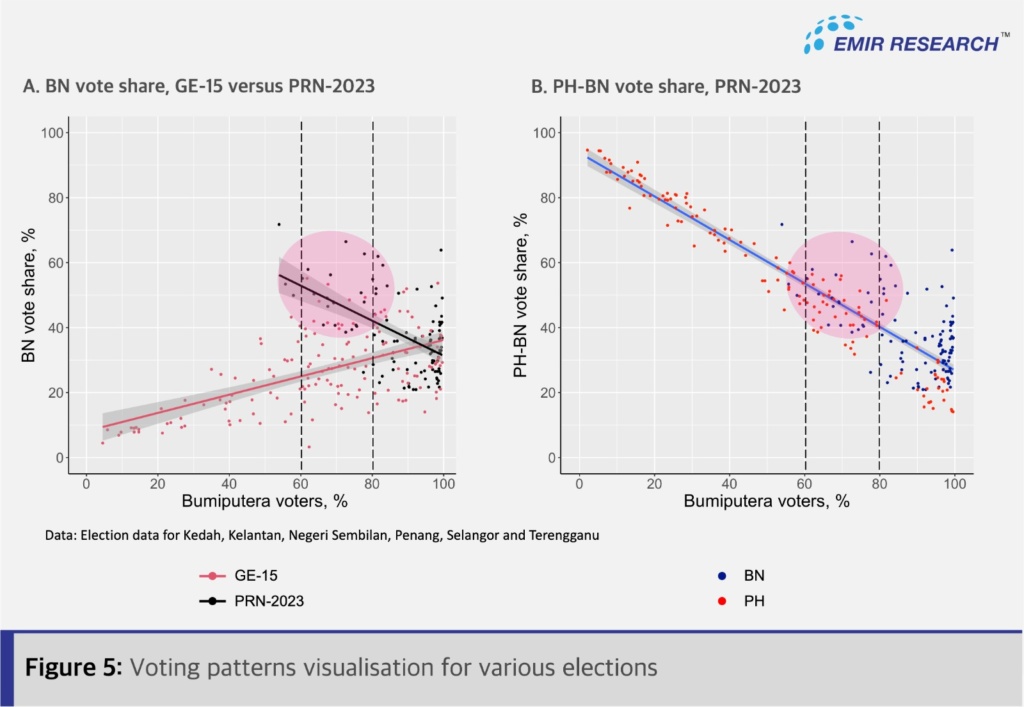
Of course, such a divergence of the trends could be due to various reasons. For example, unlike general elections, state elections might be influenced a lot more by the local issues and local candidate factor.
Looking at the bigger picture of the trend for PH-BN coalition vote share in PRN-2023 (as shown in Figure 5B), it becomes evident that BN’s vote share mostly followed this trend.
This suggests that it was likely the association with PH that gave BN an unexpected boost, or that there was indeed some transfer of votes, particularly in areas where Malays make up 60% to 80% of the population.
Therefore, if anything else, PH-BN now needs more constructive-integration as it is beneficial for both.
PAS, unsurprisingly, is once again expressing its willingness to collaborate with BN, but not with pro-DAP leaders, in an obvious effort to divide and destabilize the Unity Government (UG). This aligns well with their past strategy of forming alliances for personal gain (refer to “PAS Politics — Sleeping with All Strategy”).
However, UMNO must understand that their market is very similar to PAS and Bersatu and therefore, they will be further weakened – down the pecking order in ranks, while in UG, they yield a better rank. Losing so many seats in PRN-2023 does not help the case either. Anti-hopping laws also discourage MPs or state assemblymen to cross over as they lose their seats if they do and re-contest under the current wave is not a guarantee!
Additionally, the current status quo provides much-needed “TIME” for UMNO to reinvent itself and for the UG as a whole to focus on important deliverables.
PAS-PN’s simple narrative that worked exceptionally well in GE-15 that they are like UMNO but not corrupt would now be difficult to sell, especially among educated Malays unless they can explain involvement in corruption cases by their own leaders.
Therefore, UMNO must take the hint. UMNO President Dato Seri Zahid Hamidi knows what he needs to do to ensure Umno doesn’t slide any further. Great statesman must think about trans-generational pathways of the people, sometime monumental personal sacrifice needs to be done for the greater good of his people, party and nation. UMNO should consider bringing back valuable assets such as Khairy Jamaluddin and Shahril Hamdan, and empowering individuals like Dr Zambry Abdul Kadir and Dr Ashraf Wajdi.
Immediate independent and competent post-mortem must be done by UG to address the Malay concern reiterating that their rights are preserved in line with Article 3, Article 152, Article 153 of the Federal Constitution while also upholding the position and roles of our Constitutional Monarchs. The findings of which must be communicated well with all strata of societies especially the Malays to allay their never ending fear, possibly the only majority that are perpetually fearful of the minority in the world. Mostly accentuated by politicians who practices high intensity of identity politics of race and religion that divides, rather than, unifies,
UG government must focus its efforts on reducing the people’s burden by implementing programs that will help the people holistically – reducing the pressure of price increases, increasing the number of affordable housing, increasing allocations for affordable and quality public health and education programs, and adding programs that lead to quality jobs with dignified wages.
The current administration is already working on delivering along these lines. However, they need to do more. They need to do it faster. And they need to do better.
And they need to communicate it better addressing urban, rural, youths etc. while employing the right social media strategy. UG needs a powerful communication team addressing urban, rural, youths etc. employing the right social media strategy – balance between rational and emotional appeal. Tell them what UG is doing and how it will benefit them! Strategic communication of UG needs to be on steroids because so far PN outnumbers them by 10:1 Tik-Tok content.
UG also needs to speed up its efforts on the path of radical transparency, rule of law and fighting the evil of corruption holistically:
- Reform the Malaysian Anti-Corruption Commission (MACC).
- Resolve major scandals such as DNB (5G), foreign labour administration, Felda and so on – the establishment of a Truth, Recovery and Amnesty Commission (TRAC) to recover at least 80% of the amount of money and property that has been embezzled by politicians, businessmen, the public sector or the private sector (refer to “Malaysia’s RM4.5 Trillion Losses to Corruption & Leakages — It is time to TRAC !”).
- Separate the Office of the Attorney General from the Public Prosecutor.
- Restore the authority of judicial institutions that carry out judicial work independently
- Restore the authority of parliamentary institutions.
- Create a political funding mechanism with integrity.
- Make the governance of all government-owned companies (GLCs) at par with international standards. Singapore and Norway has good model of governance.
- Increase the transparency and integrity of the budget and the budget process – institutionalise the input-output-outcome-impact-based (IOOI) approach (refer to “Recalibrating National Budget – Eradicating Leakages and Corruption”).
UG must continue to promote fair and equitable economic growth while building an inclusive, moderate (wasatiyyah) and glorious Malaysia on the world stage:
- Advance the economy of Bumiputera and all Malaysians.
- Stimulate investment and simplify business and trade processes.
- Introducing a people-friendly and business-friendly taxation system.
- Make government schools the best choice for the people.
- Create the best, balanced and relevant curriculum.
- Manage the problem of “brain drain” that leads to the loss of “human capital” that is so needed.
- Restore the authority of public universities and higher education.
- Empowering social institutions, civil society and social entrepreneurship.
- Make Malaysia a country known for its integrity not for its corruption.
- Defending national borders from invasion, smuggling and human trafficking.
- Dignify Malaysia’s role in international institutions.
The elections are over. It is time to stop divisive rhetoric and focus on delivering to the people.
Dr Rais Hussin is the CEO of EMIR Research, an independent think tank focused on strategic policy recommendations based on rigorous research.
刊登于当今雪州
埃米尔智库:六州选举结果 不应解读为对团结政府公投
(莎阿南18日讯)埃米尔智库(Emir Research)指出,在8月份落幕的六州选举不应被解读为是对团结政府所进行的公投。
埃米尔智库总执行长莱士胡先在撰写六州选举结果分析时提醒各界,不要将六州选举成绩视为国民所反映的情绪,尤其在政治议程催化下,这样的概括性思维或在坊间误传。
莱士胡先指出,即便在2018年全国大选中,大部份的希望联盟(HARAPAN)与国阵(BN)的支持票转向国盟,但坊间仍没有实际证据证明受到“绿潮”来袭。
“在马来西亚的国情底下,我们不应过度诠释选民的投票模式。基于这个理据,六州选举不应视为对中央政府的公投,即便有部分人士希望大家相信这样的论述,而他们也在试图说服大家希盟与国阵的结合,对国阵而言是不利的。”
相反的,六州选举的数据显示,即使国阵在过去的选举中获得的支持率逐渐下降,但国阵在六州选举的表现并没有如大家所预料般差。
“拿国阵在第15届全国大选与2023年六州选举的成绩对比,我们将发现惊人的差别,尤其在马来选民占60%至80%的选区。”
他说,国阵在这些选区的支持率已增加,证明了国阵与希盟合作后,国阵支持率获得意想不到的推动。
“因此,希盟与国阵需要进行更多有具建设性的结合,这对两大联盟而言是有利无弊的。”
此外,莱士胡先指出,虽然巫统在六州选举中失去竞选议席总数的三分之二,但其选举表现相对稳定,与第14届全国大选的数据相比,表现并没大幅度恶化。
“不过,六州选举结果也反映了我国在本土主义政治意识与身份认同议题影响下仍处于分裂的氛围。”
莱士胡先说,其智囊团能轻而易举模拟各联盟在州选举的胜负,尤其按照种族差异轻松模拟出选举结果,然而,这样的情况令他堪忧。
“这意味着,大马依旧处于分裂的氛围,分裂情况或比以往更严峻。然而,在地缘政治与经济面临严峻挑战之际,大马更需要团结一致。”
莱士胡先说,问题症结源自政客为了自身利益,强化了种族与宗教色彩,许多大马公民仍按照这一因素投选政党。
他认为,这也反映了我国政客与选民的政治意识未完全成熟。
“与其抛出有效治国政策,部分政治人物仍选择玩弄种族与宗教情操,选民投票时并非全然以政治领袖的品格和诚信,或考量国家面临的重要议题而作出选择。”
“常见的情况是,有者在不假思索的情况下就接受一切伤害性与分裂的言论,就像一个小孩子迫不及待接受糖果一样。”
在今年8月份举行的第15届六州选举中能,希盟与国阵组成的团结政府守住了雪兰莪、森美兰和槟城,国盟则守住吉打、吉兰丹和登嘉楼的州政权。

